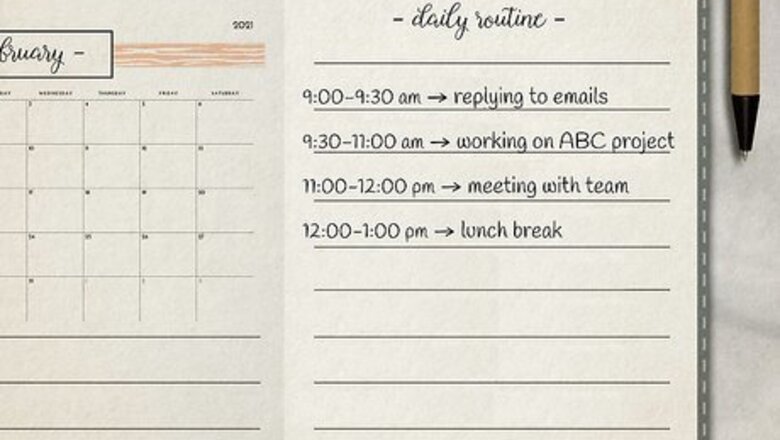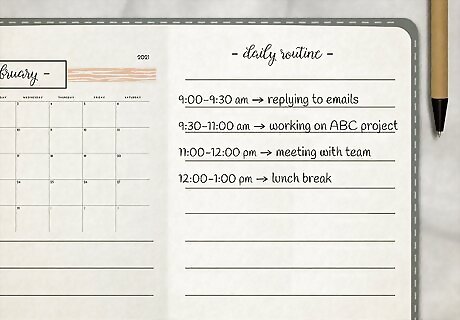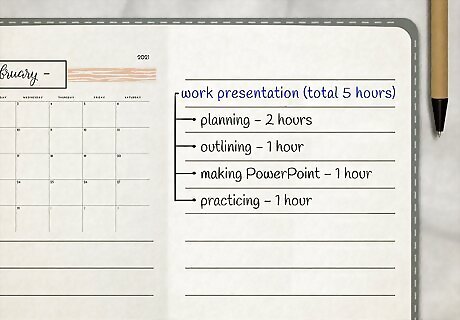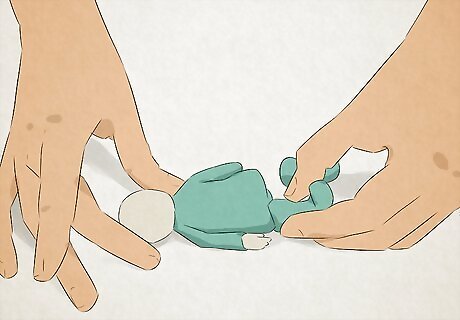
views
Chunk your total schedule into smaller blocks.

Time blocking your day helps it feel shorter. Think about what you usually accomplish in a given day. Chunk each major task into a time block; once you finish the first block, move on to the next one. This type of schedule helps you concentrate, and makes you focus less on how much time is still left in your boring activity. At work, you might spend 9 to 9:30 AM replying to emails, 9:30 to 11:00 AM working on a personal project, 11:00 AM to 12:00 PM sitting in on a meeting, and 12:00 to 1:00 PM on your lunch break. At school, you might spend 6:30 to 7:00 AM taking the bus to school, 7:00 - 7:30 AM mentally preparing for the school day, and 7:30 to 9:00 AM sitting in English class.
Try not to stare at the clock.

The more you focus on something, the more aware of it you become. Think about the last time you counted down to the new year—it felt like the longest 10 seconds ever, right? That’s because you’re super focused on the countdown and nothing else. The same logic applies to your daily life and routine. The less you look at the clock, the quicker time seems to feel. It can be hard to avoid the clock when it’s plastered to the corner of your computer screen. Try covering it up with a piece of tape so you aren’t constantly tempted to check it out. You can also try distracting yourself by making some top 10 lists of your favorite foods, games, video games, and the like. By focusing your attention on something else, you may not check the clock as much.
Break up less pleasant projects into bite-sized tasks.

Any large, looming task feels like it’ll take forever to complete. Change this perspective by adjusting the way that you approach your projects. As you dive into smaller, more doable tasks, you’ll not only feel more productive but like time is passing by a little faster than it was before. If you have to do a presentation for work, you might dedicate 2 hours to planning, 1 hour to outlining, 1 hour to making your PowerPoint, and another hour to practicing. If you have a huge paper due for class, you could dedicate 1 week to research, 2 weeks to writing, and 1 week for revisions.
Switch on some instrumental background music.

Background music helps you feel more productive, which helps time pass more quickly. Research shows that working with background music helps your regular, repetitive tasks feel less boring and unpleasant. For maximum productivity, choose some tunes that don’t have any lyrics, as lyric-filled songs can be pretty distracting to listen to. Check YouTube and music online streaming services to see if they have any classical music playlists you can jam out to while you work, study, or focus. Movie and video game soundtracks are also great options to check out.
Stay focused and “in the zone.”

Time passes more slowly for a distracted mind. Center and refocus yourself by taking several deep breaths. Going for a walk outside is another great way to recalibrate your brain and help yourself really focus and settle into a task. Here are some other great ways to get focused: Practicing mindfulness Eating a healthy diet Exercising regularly
Build routines into your daily schedule.

The more you do something, the faster the experience seems. When you were a little kid, it probably felt like 10 years passed between each of your birthdays rather than 365 days. But as you get older and older, that 365-day gap hardly feels as endless. Apply that same principle to your day-to-day life—the more you regularly do and experience something, the less slow and boring it appears to be. If you work from 9 to 5, you might set your alarm for 7:30 AM, eat breakfast at 8:00 AM, clock in at 9:00 AM, and clock out for your lunch break at 1:00 PM. If you’re a student, you might set your alarm an hour before the school bus arrives, spend 10-15 minutes in the library before class, and eat lunch at the same time each day.
Sprinkle fun activities into your day.

Time always seems to speed up when you’re enjoying yourself. This isn’t to say that you should take an hour-long phone break in the middle of a study session or workday, but a few fun short, fun activities can go a long way in making your schedule feel more manageable and bearable. You might: Play a game on your phone for a couple of minutes Step outside to get some fresh air Shoot your friend a text Watch a short, funny video
Spend time with friends.

Stress and boredom can make time tick by a lot more slowly. Research shows that people who are stressed and unoccupied feel like their days stretch on for longer. Meanwhile, people who regularly spend time with their friends and loved ones feel less stressed and more fulfilled. The next time you’re feeling bored, call up a friend and see if they can hang out—you may be surprised by how much time speeds up when you’re together!
Play a mind game with yourself.

Games are a great way to pass the time quickly, even if you’re the only one playing. Mind games are an especially great way to eat up time—it’s easy to get lost in a cryptic puzzle or logic problem. Here are a few brain teasers to help speed up your internal clock: Organize 3 toothpicks so they create the number 9. Transform the word “wall” into the word “firm” using a series of 4-letter words. You can only adjust 1 letter in each sequential word.
Read an enthralling book.

Finding a long, riveting book can make hours disappear. Think about which genres pique your interest the most. Are you totally entranced by historical romance novels, or is an action-packed thriller more your speed? Here are a few book recommendations to help you pass the time: Fiction: Please See Us by Caitlin Mullen, Journey of the Pharaohs by Clive Cussler and Graham Brown, The Love Story of Missy Charmichael by Beth Morrey, Westering Women by Sandra Dallas Non-fiction: The Beatles from A to Zed by Peter Asher, She Can Really Lay It Down by Rachel Frankel, The Open Heart Club by Gabriel Brownstein, The Cigarette: A Political History by Sarah Milov True Crime: Highway of Tears by Jessica Mc Diarmid, The Lost Brothers by Jack El-Hai, The Third Rainbow Girl: The Long Life of a Double Murder in Appalachia by Emma Copley Eisenberg, American Sherlock: Murder, Forensics, and the Birth of American CSI by Kate Winkler Dawson Biographies: The Less People Know About Us by Axton Betz-Hamilton, Elvis Through the Ages by Boze Hadleigh, King Charles: The Man, the Monarch, and the Future of Britain” by Robert Jobson Audiobooks are another great time-passing option if you don’t feel like sitting in one place for a long period of time.
Pick up an interesting hobby.

Hobbies are fun and engaging, making it easy to pass the time. Interested in learning how to play guitar, or wanting to learn a new language? Jot down a list of different activities you’d like to try, and see which ones are the most doable and accessible with your schedule and lifestyle. You could: Study a new language Teach yourself coding Learn how to play a musical instrument Make origami Learn to cook
Write in a journal.

Jotting down your thoughts can make time pass by more quickly. Journaling is a great pastime—all you need is a blank notebook to jot down anything and everything that’s on your mind. Writing down your goals, stressors, and everyday thoughts is a healthy, productive way to work through your feelings and experiences, all while making the clock tick a little bit faster. Here are a couple of prompts to get you started: Who is your most trusted friend and why? What are 5 qualities you’d like your future spouse to have? What is your favorite part about yourself? Starting a blog or tackling a creative writing project are some other great ways to pass the time in a fun, productive way.
Tackle a fun art project.

It’s easy to lose track of time when you’re in the creative zone. From paints and pastels to clay and photography, there are countless ways to channel your artistic prowess—all while eating up a good chunk of time throughout the day! Find an art project that really speaks to your interests and passions, like: Taking some artsy photos Making a collage Painting a portrait Making a clay sculpture If you’re totally new to the art world, sample some online classes and video courses. These are a great way to learn the ropes at your own pace.
Set aside time for meditation.

Regular meditation helps you enter a timeless state. Think of it this way—your mind is what keeps track of time, and meditation is all about clearing your mind. So, when you practice meditation frequently, you may feel like time is passing more quickly when you’re “in the zone.” You can find a guided meditation recording on YouTube to help you if you have never meditated before. You can even meditate while doing active things, like running. Try choosing a mantra to repeat and focus on as you go about your day, like “I choose my own path,” “I am devoted to myself and my needs,” “My positive thoughts can carry me through any challenge,” and “I decide whether my day is good or bad.”


















Comments
0 comment